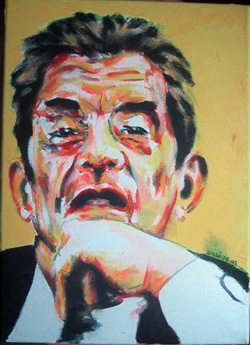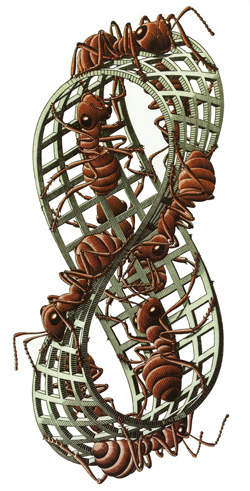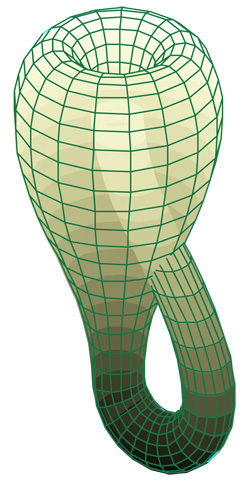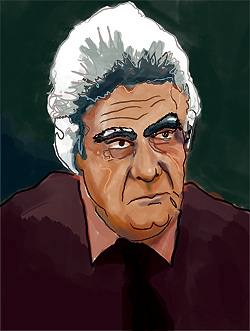
Your complimentary articles
You’ve read one of your four complimentary articles for this month.
You can read four articles free per month. To have complete access to the thousands of philosophy articles on this site, please
Books
Anxiety by Jacques Lacan
Peter Caws critiques Jacques Lacan’s psychoanalytic obscurantism.
Some thirty years ago, at an academic retreat in the south of France, I met a young woman who announced herself as a lacanienne – a disciple of the psychoanalyst Jacques Lacan (1901-1981). At that time Lacan’s so-called ‘seminars’ were being published one after another in French, as the Seminaires. However, they weren’t really seminars, more like meandering lectures transcribed by faithful followers. There were already a lot of them, and more to come. Reading them was obligatory for people like my new acquaintance, and I wondered how she managed to take it all in. “Je pratique,” she said, “la lecture flottante” – “I use the technique of floating reading.” I knew about attention flottante – a psychoanalytic practice in which the analyst allows him- or herself to listen as it were loosely to the patient, without any expectation of particular clues to the latter’s state of mind, without taking any notes, almost without listening at all; rather, letting the patient’s unconscious speak directly to his or her own. But I hadn’t come across the technique as applied to reading, unless in the form of what we used to call ‘skimming’. Maybe it could be called ‘reading with the third eye’, after ‘listening with the third ear’ – a name given to the relevant psychoanalytic practice by Theodor Reik, one of the few precursors other than Freud for whom Lacan seems to have had any genuine esteem.

Lacan proclaiming his genius
Lacan portrait © Ignacio Garate Martinez 2012
Faced with the three-hundred-odd dense pages of the tenth Seminar, at two removes from the voice of the master – first transcribed, then translated – I would have liked to have managed floating reading in my turn, but the conscience of the reviewer, along with all the bizarre flotsam on the surface of Lacan’s thoughts I kept bumping into, defeated me. In any case I doubted whether I could get in touch with Lacan’s unconscious, since it was clear from the beginning that what he was offering – an effort to bind the faithful to an ever-tighter adherence to his idiosyncratic version of psychoanalysis – was, on one level at least, eminently conscious. So I ploughed through the whole book, increasingly bemused as I went on at the thought that my job was to make something of it that would be of interest to the readership of Philosophy Now.
The Unintelligibility of Jacques Lacan
It might be asked why I took on this task in the first place. The reason was that back in the days when I was trying to make something philosophically interesting out of the structuralist movement, Lacan was one of the writers who seemed to offer some promise in that direction. He occupied a position in psychoanalysis analogous to that of Claude Lévi-Strauss in anthropology, Roland Barthes in literary criticism, Louis Althusser in Marxism, or Michel Foucault in the history of ideas. His early publications, such as the Ecrits [Notebooks], while verbose (but which French thinker isn’t?) still had a form of intelligibility that could be reconstructed with a bit of work. I thought it would be interesting to revisit all that.

Detail from the cover of Anxiety, after M.C. Escher
One of the Seminars, the eleventh, was published years ago as The Four Fundamental Concepts of Psychoanalysis (1973) – a largely successful attempt on Lacan’s part to justify his ‘return to Freud’ after his expulsion from the official French psychoanalytic community and his single-handed foundation of L’Ecole Freudienne de Paris. That book, no doubt heavily edited and rewritten from the seminar transcript, showed that he could be fairly straightforward when he wanted to be. Among the fans at his weekly performances, however, he didn’t have to bother; professionals and hangers-on alike flocked to their guru’s presentations and drank in every word – with what degree of comprehension it is sometimes hard to fathom.
The French title of the tenth Seminar is L’Angoisse, whose translation as Anxiety is already problematic. A correct English translation of angoisse is ‘anguish’, whereas ‘anxiety’ is a correct English translation of the French anxiété. At least the two languages seem to be making the same distinction in the same way. However, one of the French definitions of angoisse does map pretty well on to the ordinary non-medical meaning of the English ‘anxiety’, whilst the specifically medical use of anxiété is as a pathological type of angoisse. So is Lacan’s anxiety pathological? It would have been helpful to have some clarification of this little linguistic tangle.
The original French publication of L’Angoisse appears to have been a limited edition, no doubt intended, like its spoken original, for a relatively small audience of professionals and cognoscenti. It came in two hefty volumes, softbound in bright orange, with no indication of publisher, or place or date of publication. Having tracked down one of the few original copies, I find that it was put out in 1982 by a small printing house called Piranha (we can make of that association what we will). The seminar itself had taken place in 1962-3, the official French edition was published at Le Seuil in 2004, and the English translation is part of a series now being put out by Polity Press – one can’t help wondering, with what readership in mind? Fifty-odd years is a long time to wait for the word from on high, and it would seem that only those transfixed by Lacan’s fame and charisma, or perhaps professionally persuaded enough to wish to follow his eccentric example, would want to wade through these rambling monologues.
The Seminars, together with Lacan’s other works, constitute a massive and repetitive body of doctrine, intended to throw light on the human condition and the practice of psychiatry. I will return to the doctrines, but given the occasion of this review, will first address the claim, sometimes direct and sometimes implied, that they are of philosophical importance. ‘Anguish’ and ‘anxiety’ belong to a closely-related cluster of terms, including ‘fear’ and ‘dread’, which has been a happy hunting ground for existentialists since Søren Kierkegaard (1813-1855). This is Lacan’s chance to show the relevance of his concept of anxiety to the recent history of philosophy, and he takes it in the very early pages of the Seminar. I provide here an example of the way he approaches this topic, both to give a flavour of his style and the verbal padding and glancing commentary that is typical of his approach, and also to suggest how easily this book could have been a lot shorter, with a bit of determined editing:

A ‘higher-dimensional structure’: A Klein bottle
“Everyone knows that projecting the I onto the inroad to anxiety has for some time been the ambition of a philosophy that is termed existentialist. There’s no shortage of references, from Kierkegaard to Gabriel Marcel, Shestov, Berdyaev and a few others. Not all of them have the same place, nor can they be used in the same way, but I insist on saying at the start of this disquisition that this philosophy – insofar as, from its patron saint, named first off, down to those whose names I’ve listed after him, it incontestably shows some decline – is marked, I feel, with some haste and even some disarray, I’d say, in relation to the reference in which, in the same era, the movement of thought has put its trust, namely, the reference to history… Since I have called on two witnesses here, Sartre and Heidegger, I won’t hesitate to call on a third, in so far as I don’t think him unworthy of representing those who are here, observing what he is going to say, and that’s me” (pp.7-8).
No hesitation then in enrolling himself among the leading thinkers of his time. Yet it is notable that in all this he does not go into any detail as to the positions actually held by the philosophers in question, but just contents himself with name-dropping. This is quite characteristic of his mode of operation – he comes across not as learned and scholarly, but as grandiose and narcissistic. “Those who are here, observing what he is going to say” is just one example of a recurring preoccupation with himself in relation to his audience: here they are, all of them, listening to me, so I must be as good as these other people.
Confident in his authority and domination, Lacan talks down to these listeners, repeatedly alluding to what he has been teaching them, what they will miss if they don’t attend regularly, what other people have missed by not paying attention to him. A typical case: he recommends that they look up the texts of Kurt Goldstein, “very accessible texts since they’ve been translated into French, to see how close these formulations are to our own, and how much they’d gain in clarity by referring to ours more expressly” (p.60). Again, it’s all about him. Two delicious ironies here: Goldstein’s work was actually done a decade or so earlier than Lacan’s; and Lacan takes pride in his own lack of clarity, his style having “a certain Gongorism about it, as everyone knows” (p.42) (Luis de Gongora was famous for the deliberate obscurity of his writing). After acknowledging this similarity, Lacan says, “Well, I don’t give a damn.”
Assessing Lacan’s Doctrine
Extracted from its vanity and verbosity, Lacanian doctrine does represent an impressive theoretical structure, replete with borrowings from and allusions to a wide range of disciplines, above all of course Freudian psychoanalysis, of which Lacan considered himself the heir and trustee; but also Saussurean linguistics, and most especially, mathematical topology. This is not the place for exposition of this doctrine, which in its roundabout and fragmentary way occupies the bulk of the book, but it is an occasion for commenting on the scientific standing of his theories. I happen to think that psychoanalysis does belong among the sciences (see for example my ‘Psychoanalysis as the Idiosyncratic Science of the Individual Subject’, Psychoanalytic Psychology 20, 2003). Unfortunately, Lacan is of no help whatever in making this argument, because he manages to confuse the issue with spurious technicalities not obviously applicable to actual cases, and thus to cast doubt if not ridicule on the whole enterprise.
It is true that the crucial concepts required for the analyst’s clinical enterprise are of enormous difficulty and complexity. As a case in point: what exactly is a living human subject? How are we embodied, how gendered, how stressed by life experiences, how affected by and how expressed in what language, how to be understood, how to be helped in dealing with the fears and the anguish – not to mention the anxiety – produced in it by the hostility of the world and the body and other people? But is it at all useful to compare the human subject to a Moebius strip, as Lacan does (pp.96, 204, etc.), or to any of the other topological structures of higher dimensionality scattered through his pages? Moreover, it isn’t clear that he really understands any of them, although they do make for nice diagrams. Granted that the subject is experienced as it were from its inside whilst presenting itself to others as an outside; granted also that the Moebius strip manages the neat trick of appearing to have two sides, an inside and an outside, while in fact having only one continuous side – what light does the one fact throw on the other? Perhaps the metaphor is provocative, but its relevance for therapeutic clinicians unfamiliar with higher mathematics strikes me as beyond dubious. (It does provide the cover art for the book – an Escher graphic of six ants following one another around a lattice in the form of a Moebius strip – an apt image of Lacan and his seminar audiences.)
Here this reviewer begins to feel contrite, seeming to be making fun of a notable and distinguished figure of twentieth century culture. But these comments aren’t just sniping: they are a product of reading not only Anxiety but much more from the same source, and of personal if brief encounters with the author himself, as well as with other figures in French intellectual life who knew him, and knew also some of the patients who committed suicide while under his care, if ‘care’ is what it was (and in at least one case, in despair at not being admitted as his patient). Lacan wasn’t merely a theoretician, he was a therapist of repute who was at the same time not only unorthodox but often unscrupulous and exploitative, and he did great harm under the guise of being a benign father figure to a family of besotted acolytes. In a review of Elisabeth Roudinesco’s history of psychiatry in France, Raymond Tallis aptly dubbed him “the shrink from hell.”

Lacan, older and more distinguished
Lacan older portrait © Pablo Secca 2009
All this is not a recommendation not to read this book – I have certainly not done justice to its eccentric richness: for example, its treatment of the fundamental complexity of the relation between subject and object, from the ‘objet petit a’ (a from autre), ‘the object’ with a small ‘o’, to the full-fledged Other (Autre) as Object, by way of the subject’s coming to specular awareness in the mirror-image of itself. The ‘objet petit a’ is any object of primitive desire that is not fully an object for a subject, on the part of a subject that does not yet fully know that it is a subject. That’s one way of looking at it at least. And along the way is the flotsam I mentioned at the beginning, including details of the genitalia and sex life of exotic animals and insects, as well as of the complementary complexities of sadism and masochism. In this connection Lacan takes issue with an old distinction that holds fear to be of some fearful object, but anxiety to be a state of apprehension without an object. No, he says, anxiety is not without an object, although that object often turns out to be an attitude or state of mind of some Other on whom the anxious subject wishes to make an impression or from whom he or she wants recognition (as in the case of the ‘performance anxiety’ many psychiatric patients are familiar with).
No, by all means read Lacan if you have an appetite for long-winded free association and bold if frequently impenetrable speculation. He’s sometimes quite good at these things. Just don’t take him at his own estimation, or expect to learn anything reliably useful from him about any particular human being. We aren’t all made like that. It’s not obvious that any of us are.
© Prof Peter Caws 2016
Peter Caws is University Professor of Philosophy Emeritus at The George Washington University, Washington DC.
• Anxiety: The Seminar of Jacques Lacan, Book X, ed. Jacques-Alain Miller, trans. A. R. Price, Polity Press, 2014, 352 pp, $19.95 pb, ISBN: 074566041X









